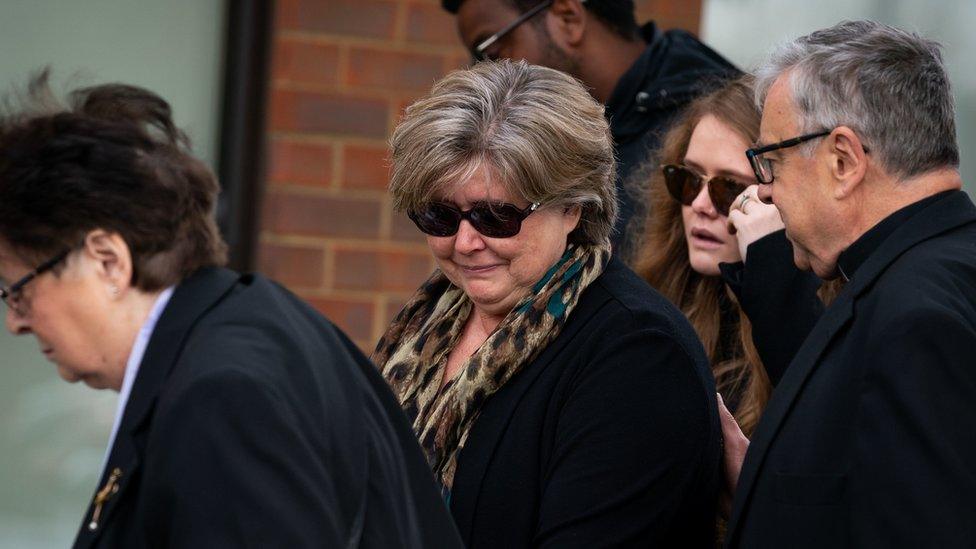Sir David Amess: The lesser-known concerns of the Southend West MP
- Published
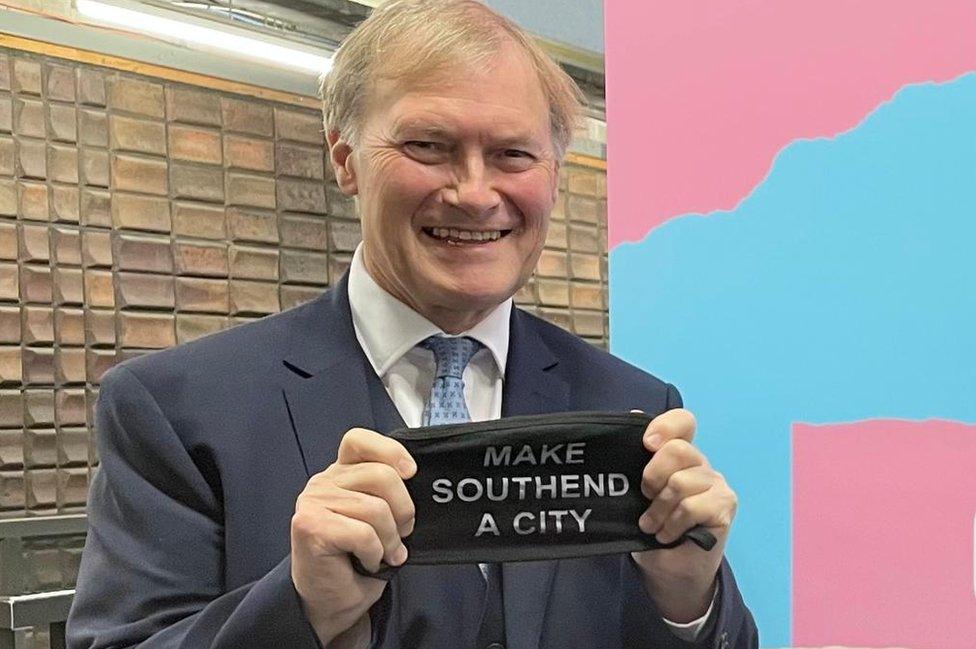
Sir David championed the bid to make Southend a city
While his work on improving animal welfare standards and getting a fitting tribute installed in memory of Dame Vera Lynn are well known, Sir David Amess championed a myriad of other causes, too.
According to Hansard, Sir David made more than 1,300 spoken contributions in Parliament.
From 1983 until his killing on Friday, he raised numerous issues and topics ranging from ending fuel poverty to securing city status for his beloved Southend.
When newly elected Conservative Ipswich MP Tom Hunt asked how to be an effective constituency MP, most suggested Sir David as a role model.
"Sometimes, there would be these debates when we'd finished the Parliamentary session and there was a special debate where we could basically mention anything," he said.
"Most people would have a three- or four-minute speech and mention one thing or maybe two things.
"I remember twice hearing Sir David getting up and he would mention 19 or 20 different things to do with his constituency."
During nearly four decades in Parliament, Sir David raised countless number of issues and mentioned many more people and organisations trying to make a difference in Southend.
Here is just a handful of the lesser-known issues he championed as an MP.

Hospice care
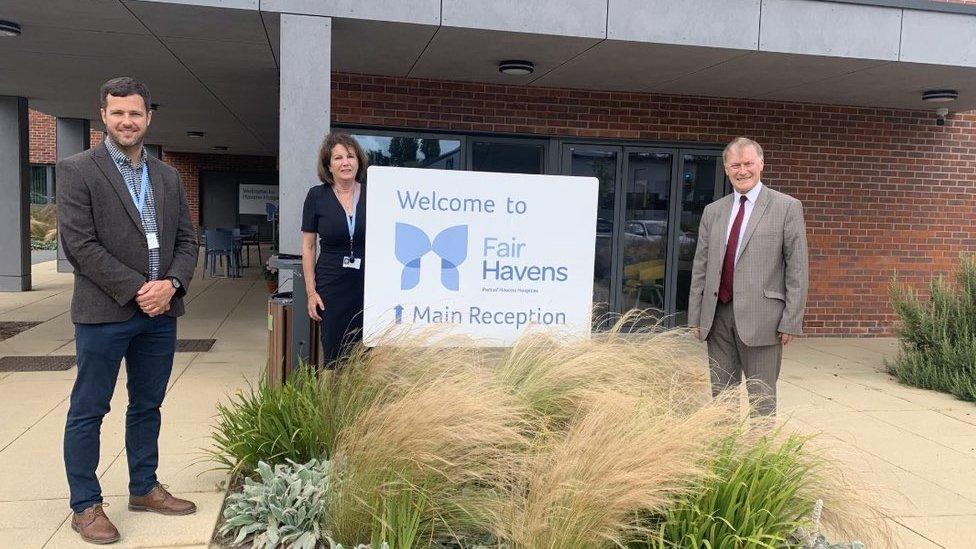
Sir David told the House of Commons that hospices provided "core services" and warned of a "crisis of funding"
"Until I became a Member of Parliament, I had no experience of the hospice movement," Sir David told the Commons in 2008.
"I witnessed a miracle in Basildon, because we had a plot of land and we built a hospice with no wealthy benefactors and no largesse from this Parliament or the European Parliament.
"The role of hospices has changed enormously. They are no longer add-ons. They provide core services."
He spoke of the "crisis of funding" that faced hospices and warned that while most people would readily give to children's hospices, adult hospices often struggled to get the money they needed.
He was a staunch advocate of the work done by Havens Hospices in Southend and its role in the community.

Steve Smith, chief executive of Havens Hospices, told how Sir David stayed the entire evening during their Hares About Town Grand Auction
"Sir David had a long-standing relationship with Havens Hospices," said Steve Smith, chief executive.
"As local MP to Fair Havens [its Southend hospice] he fundraised for the charity, was an advocate for hospice care, and often raised issues in the House of Commons on our behalf.
"Recently, he was guest of honour at our Hares About Town Grand Auction, staying for the entire evening and taking the time to speak with guests and staff and subsequently writing to congratulate all involved.
"When Sir David visited Fair Havens in August, he spent time with staff and expressed his interest and admiration for our contribution towards the care of his constituents.
"Our thoughts are with his family and friends at this challenging time."

Loneliness
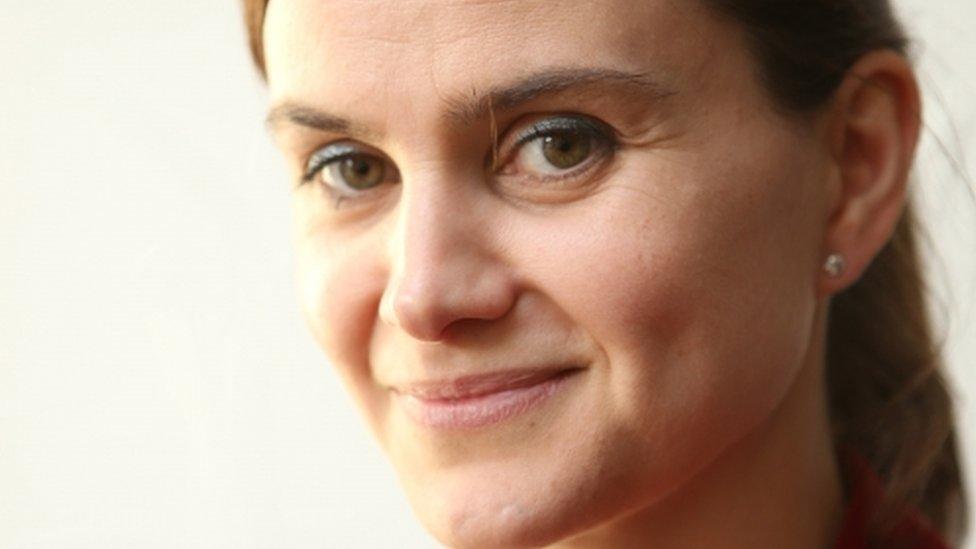
Earlier this year, Sir David praised the work of Labour MP Jo Cox, who was killed in 2016, for work tackling loneliness
"Loneliness is a very complex experience," Sir David told the House on 15 June. "If we are all honest with ourselves, the number of true friends that we have can be counted on our hands."
During the same speech, external, he praised the work of Jo Cox, the Batley and Spen MP who was killed in June 2016 outside a library in Birstall where she was due to hold a constituency surgery.
Shortly after she became an MP, she helped set up a cross-party commission to look at the scale and impact of loneliness, external.
In speaking about loneliness during the pandemic, Sir David said: "My area, Southend West, has the largest number of centenarians in the country.
"Not many of their contemporaries are alive, obviously, so we need to look out for elderly people in particular.
"There is a stigma about being lonely and it needs to be eradicated, because it is hindering people in reaching out for help."
He praised a number of organisations in his constituency working to ease loneliness, including the Trust Links charity, for, he said, "supporting those with mental health and wellbeing issues through gardening and community involvement".
Gareth Evans, head of operations at Trust Links, said: "He was the model of what is a great constituency MP.
"He genuinely cared and had time for everyone and he would remember people's names and circumstances and would follow up on what was happening."

Post offices
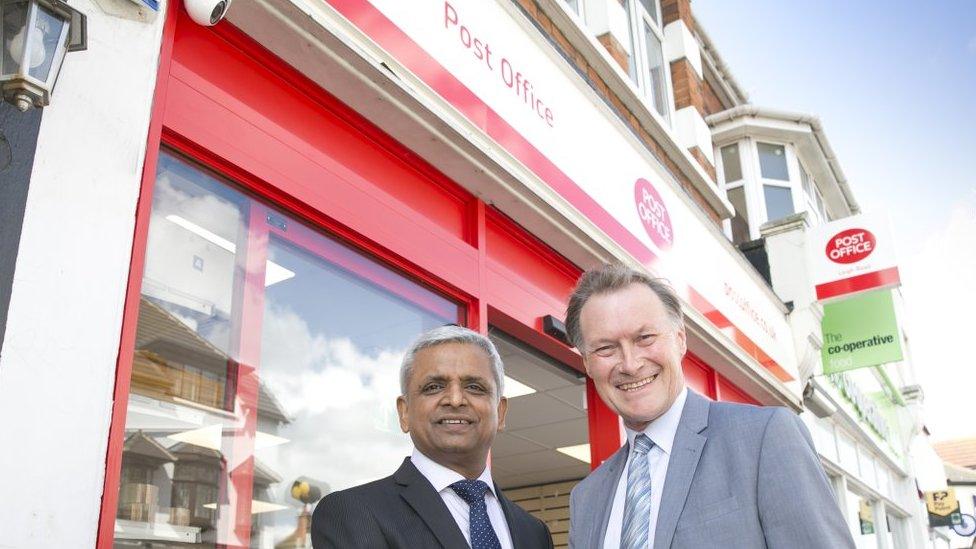
Sir David, shown here with Leigh Road Post Office postmaster Upendra Patel, was a keen advocate of post offices
In 2007, Sir David voiced his concerns about the compulsory closures of thousands of post offices.
He pointed out his constituency had the "greatest concentration of senior citizens and the most centenarians" in the country and spoke of the "devastating effect" of closures on the local community.
He told how Southend West had, at the time, seen 10 post offices closed, and sought reassurance more closures were not on the cards.
In 2018, he helped celebrate the opening of a new post office in Eastwoodbury Crescent, run by Steve Piratheepan.
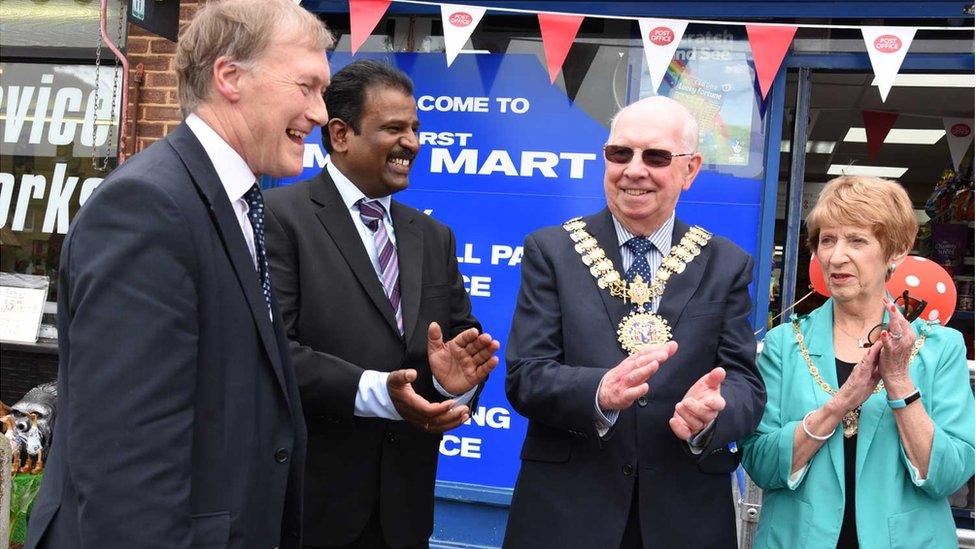
Sir David celebrated the opening of a new post office in 2018 at Eastwoodbury Road in Southend
The Post Office paid tribute to Sir David on Twitter, external.
It said: "Sir David Amess MP attended many events at Post Office, always with a big smile and he showed real interest and support for our postmasters and the communities that they serve.
"Our thoughts are with his family and loved ones. Rest in Peace."

Women's mental health
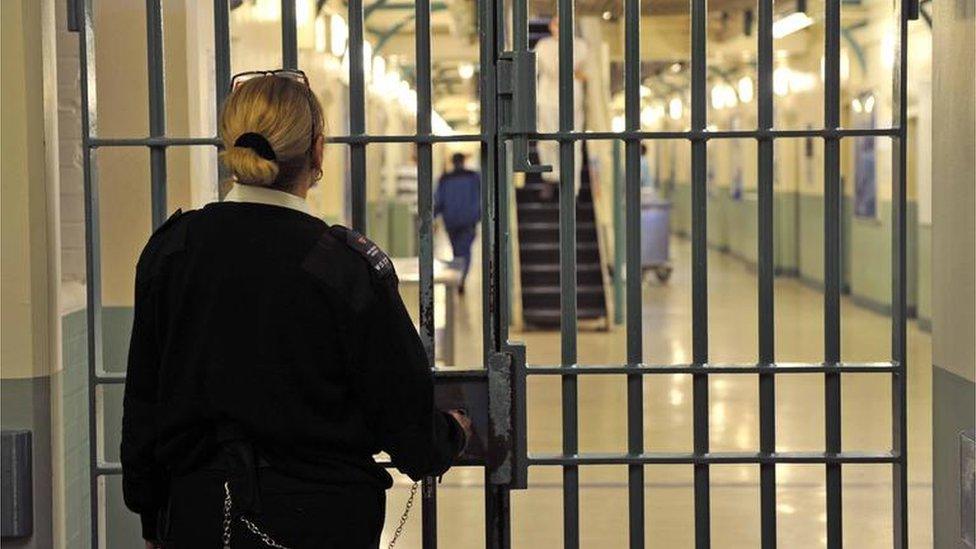
Sir David said more attention needed to be paid to the welfare of women in prison
In 2019, Sir David spoke in Parliament about women's mental health.
"As a man, I make no apology for contributing to this debate," he said at the time, "because I come from a household in which four of my five children are women.
"My late mother had a big role in my life and, of course, I do have a wife.
"Women are more likely than men to experience anxiety, depression, post-traumatic stress disorder and eating disorders.
"We need to recalibrate entirely how the media put ideas into young women's minds about how they should look and how they live their lives.
"The suicide rate for young women has more than doubled in the past 10 years, which is shocking.
"Such facts are easy to speak about, but it is for the House of Commons to try to come together to think of some solutions.
"I want the government to ensure that people throughout the country who are not fully aware of the challenges women face are aware that there is help and support available."
You might also be interested in:
He also voiced concern about the well-being of women in prison.
"To express some sympathy for people who are in prison perhaps is not the cool thing for a Conservative to do," he told the Commons.
"I am grateful for the briefing from the Howard League for Penal Reform, which states that a recent study found that more than 50% of women in prison report a history of violence and trauma, which contributed to 8,317 cases of self-injury in 2017 alone."
He went on to urge the Ministry of Justice to "re-evaluate the practical support that is made available to female inmates".
Frances Crook, chief executive of the Howard League, said: "Sir David Amess was aware that imprisonment is particularly harmful for women, who account for only 4% of the prison population but more than a quarter of all incidents of self-injury behind bars.
"The Howard League is pleased to work with MPs from all political parties, and it was kind of Sir David to thank the charity as he raised this important issue in the House of Commons.
"His death is a loss to his family and friends, and an attack on our democratic and open society."

Southend
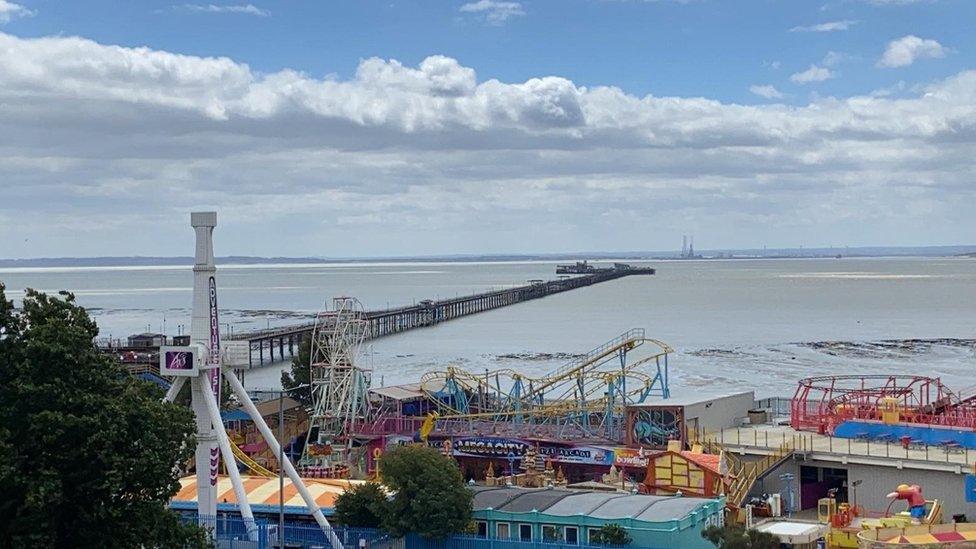
Southend, home to the world's longest pleasure pier, has been awarded city status in honour of Sir David
Hands up, Sir David's relentless pursuit of one particular issue does not qualify as a "lesser-known" concern.
Even he quipped about it when, in 2019, he said the House of Commons had "become tired of hearing me ask for city status for Southend".
What might be less well known is how Sir David sought to pip Hull to the City of Culture title in 2017.
He jokingly suggested the government faced having to pore over "the formalities of the bidding process" to decide which city to win the accolade.
Sir David suggested a lot of time and energy could be saved "by announcing now that Southend should be the City of Culture".
It did not happen, and Sir David resumed his battle for city status the old-fashioned way.
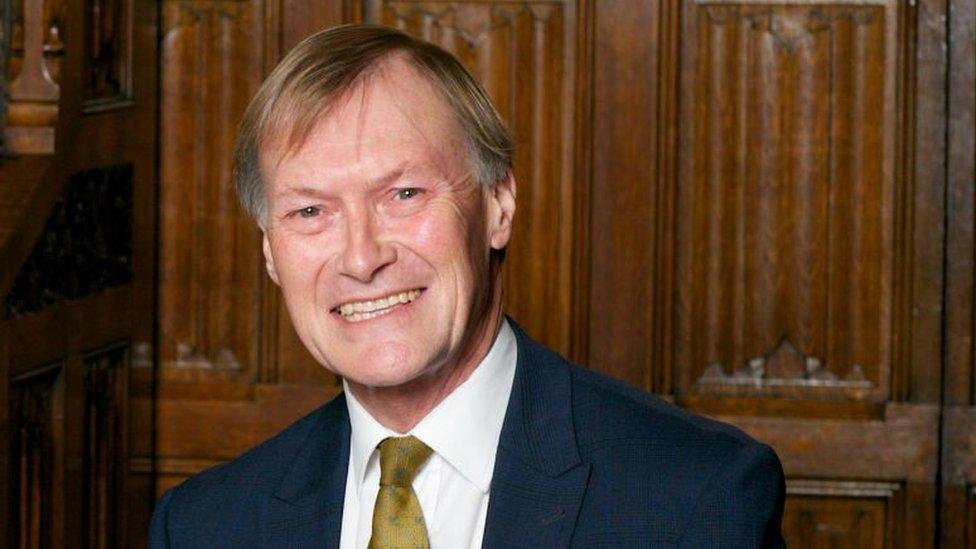
Sir David was "passionate about Southend"
In 2019 he laid out a long list of reasons, ranging from the success of the Music Man Project, external, a music education service for children and adults with learning disabilities, to the 150th anniversary of Southend Rugby Club to Leigh-on-Sea being voted "the happiest place in the UK".
Before his death, Sir David had his sights set on city status as part of The Queen's Platinum Jubilee celebrations in 2022.
On Tuesday Prime Minister Boris Johnson announced the Queen had agreed Southend would be granted city status.
"It did matter incredibly to him and he never missed an opportunity to raise in parliament and everywhere else," said Carol Mulroney, Southend Council's cabinet member for environment, culture, tourism and planning.
"What he felt passionate about was Southend. He adored Southend."

Find BBC News: East of England on Facebook, external, Instagram, external and Twitter, external. If you have a story suggestion email eastofenglandnews@bbc.co.uk, external
- Published18 October 2021
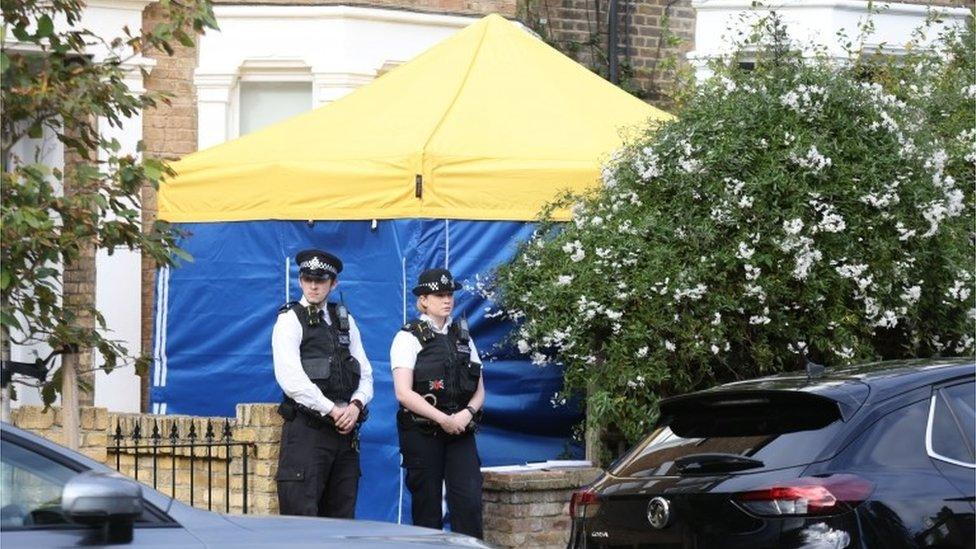
- Published18 October 2021

- Published18 October 2021
